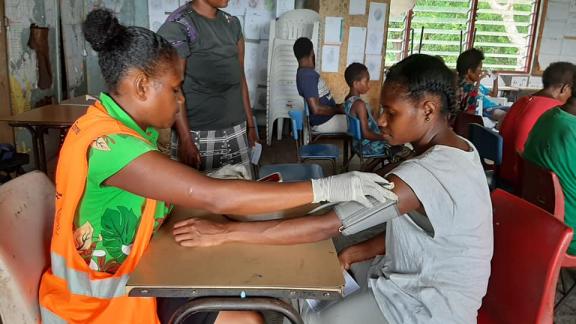Violence against women and girls is one of the most widespread human rights violations globally, affecting one in three women. In the Pacific, the issue is particularly concerning, with some of the highest rates of intimate partner violence. Studies estimate that between 60% and 77% of women aged 15-49 in the region experience violence in their lifetime. While there has been progress in legal frameworks and advocacy, violence persists in various forms, including sexual violence and harmful cultural practices, disproportionately impacting those who face multiple forms of discrimination and marginalised communities.

Advancing Access and Health Equity
Addressing violence against women and girls (VAWG) in the Pacific comes with specific challenges shaped by the region’s small island developing states and diverse cultural contexts. IPPF Member Associations (MAs) are at the forefront, providing direct support to survivors while addressing the deeper causes of gender inequality. In collaboration with regional human rights and feminist groups, Pacific MAs lead community awareness efforts and deliver vital Sexual and Reproductive Health (SRH) services. Efforts are focused on raising awareness about VAWG, supporting survivors, and pushing for greater gender equality, ensuring the well-being and rights of women and girls remain a priority across the region.
Member Associations across ten Pacific Island countries are driving these efforts, including the Kiribati Family Health Association (KFHA), Reproductive Family Health Association of Fiji (RFHAF), Cook Islands Family Welfare Association (CIFWA), Papua New Guinea Family Health Association (PNGFHA), Samoa Family Health Association (SFHA),Solomon Islands Planned Parenthood Association (SIPPA), Tonga Family Health Association (TFHA), Tuvalu Family Health Association (TuFHA), Vanuatu Family Health Association (VFHA), and Youth to Youth in Health (YTYIH) from the Republic of the Marshall Islands, the newest addition to the network.
“Our Member Associations play a critical role in supporting government-led responses in the Pacific by raising awareness and delivering essential services to all, regardless of age, gender, religion, or ethnicity,” said Dolores Devesi, Pacific MA Support and Development Director. “In some countries, they are the sole non-government provider of sexual and reproductive health services and a key force in achieving national targets and Sustainable Development Goals.”
In 2023, over 125,000 clients were reached across nine countries, with 77% being women, and nearly half a million services were delivered. Of these, 66% targeted poor and vulnerable clients, and 41% were provided to young people. 'We must ensure that services and information reach the communities that need them the most,' added Devesi.

Strengthening Reforms and Legal Frameworks
Significant progress has been made in the Pacific region in strengthening laws and policies to address violence against women and girls. Still, there are obstacles to overcome, and structural change, legislative action, and activism are required to shift the narratives.
National Action Plans:
Many Pacific countries have implemented National Action Plans (NAPs) to combat VAWG. These plans are crucial for coordinating activities in several areas, such as health, law enforcement, and social services. IPPF Member Associations actively support these strategies by advocating for including Comprehensive Sexuality Education (CSE) in schools and SRH services in national responses. In Fiji, Samoa, and Papua New Guinea, National Action Plans have been critical in mobilising and aligning government resources with local needs.
Domestic Violence Legislation:
Domestic violence legislation has recently been enacted in countries such as Fiji and Papua New Guinea (PNG) due to lobbying efforts by local human rights organisations, including IPPF Member Associations. These laws strengthen survivors' rights, including provisions for temporary protective orders and enhanced punishments for abusers. While enforcement remains a barrier, these laws are a significant step toward bringing abusers responsible and assisting victims of violence.

Regional Commitments:
The Pacific Islands Forum (PIF), representing 18 Pacific countries and territories, has made substantial commitments to tackle VAWG, including ratifying the Pacific Leaders Gender Equality Declaration. This declaration emphasises the significance of ending violence against women and girls while also committing to improving legal safeguards, fostering gender equality, and boosting women's involvement in decision-making processes. In alignment with these efforts, Pacific MAs have consistently championed these regional agreements, urging governments to translate commitments into tangible action.
For us to truly achieve a future free from violence, collaboration among governments, communities, Member Associations, and the private sector remains critical. Strengthening these partnerships and addressing persistent barriers is essential to building on progress made through policy reforms and legal frameworks. Together, these efforts can create a world where women and girls live safely, empowered to thrive without fear of violence.

Read Mamta Sylviya Chand’s powerful poem, The WAR on MY BODY, featured in our 16 Days of Activism campaign. The poem delves into the systemic oppression of women and girls, addressing issues such as sexual harassment, female genital mutilation, and forced marriages while amplifying the voices of marginalised groups, including women of colour, women with disabilities, and trans women.
For more information, contact:
Maxine Tuwila,
Communications, Voice & Media Officer
Sub Regional Office for the Pacific
[email protected]
Malarvili Meganathan,
Regional Communications, Voice & Media Advisor
East, Southeast Asia and Oceania Region
[email protected]
when









